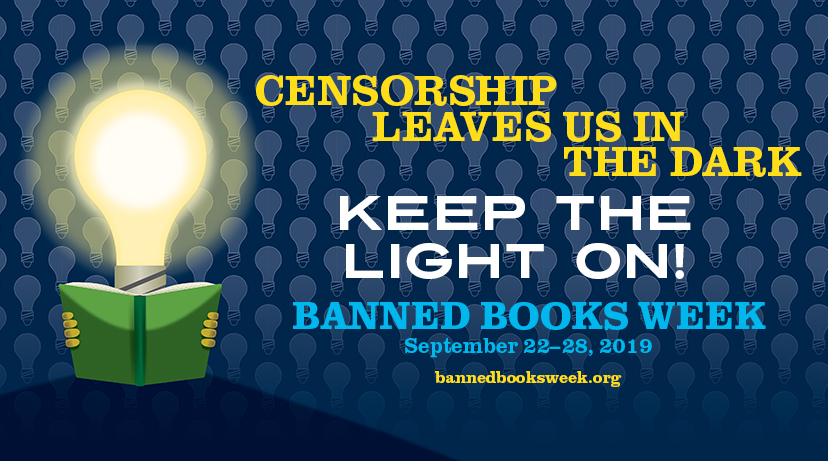ALA’s State of America’s Libraries Report hit newsstands last week, noting,
“Never have our nation’s libraries played such a pivotal role in strengthening communities through education and lifelong learning. Libraries are a microcosm of the larger society. They play an important and unique role in the communities that they serve and provide an inclusive environment where all are treated with respect and dignity. No longer just places for books, our public libraries serve as a lifeline for some of our nation’s most vulnerable communities. From community-wide issues [such] as illiteracy, homelessness and community silos, our nation’s public libraries are acting as catalysts in fostering community-wide solutions that strengthen communities.”
These statements describe our classrooms as well. And never has it been more important for us as educators and librarians to “keep the light on,” the theme of this year’s Banned Books Week, September 22–28.
As we educators consider our curricula and think about the texts we’ll offer to our students to support it, perhaps, the most important finding of this year’s report is the list of the eleven most challenged books of the year and what that list says about books that some don’t want others to read:
1. George by Alex Gino – Reasons: banned, challenged, and relocated because it was believed to encourage children to clear browser history and change their bodies using hormones, and for mentioning “dirty magazines,” describing male anatomy, “creating confusion,” and including a transgender character
2. A Day in the Life of Marlon Bundo by Jill Twiss, illustrated by EG Keller – Reasons: banned and challenged for including LGBTQIA+ content, and for political and religious viewpoints
3. Captain Underpants series, written and illustrated by Dav Pilkey – Reasons: series was challenged because it was perceived as encouraging disruptive behavior, while Captain Underpants and the Sensational Saga of Sir Stinks-A-Lot was challenged for including a same-sex couple
4. The Hate U Give by Angie Thomas – Reasons: banned and challenged because it was deemed “anti-cop,” and for profanity, drug use, and sexual references
5. Drama, written and illustrated by Raina Telgemeier – Reasons: banned and challenged for including LGBTQIA+ characters and themes
6. Thirteen Reasons Why by Jay Asher – Reasons: banned, challenged, and restricted for addressing teen suicide
7. This One Summer by Mariko Tamaki, illustrated by Jillian Tamaki – Reasons: banned and challenged for profanity, sexual references, and certain illustrations
8. Skippyjon Jones series written and illustrated by Judy Schachner – Reason: challenged for depicting stereotypes of Mexican culture
9. The Absolutely True Diary of a Part-Time Indian by Sherman Alexie – Reasons: banned and challenged for sexual references, profanity, violence, gambling, and underage drinking, and for its religious viewpoint
10. This Day in June by Gayle E. Pitman, illustrated by Kristyna Litten – Reason: challenged and burned for including LGBTQIA+ content
11. Two Boys Kissing by David Levithan – Reason: challenged and burned for including LGBTQIA+ content
Note that five of the eleven challenged books feature LGBTQ+ characters—challenges to LGBTQ+ texts have been rising.
In fact, three of the book challenges I’ve been working on just since the beginning of this month are against LGBTQ+ books:
- Fun Home A Family Tragicomic written and illustrated by Alison Bechdel, an autobiographical graphic novel sometimes described as a “darkly funny family tale.”
- Pride: The Story of Harvey Milk and the Rainbow Flag written by Rob Sanders and illustrated by Steven Salerno which “trace[s] the life of the Gay Pride Flag, from its beginnings in 1978 with social activist Harvey Milk and designer Gilbert Baker to its spanning of the globe and its role in today’s world.”
- Love Is Love written by Marc Andreyko with editors Sarah Gaydos and Jamie S. Rich, “an anthology graphic novel created as a response to the Pulse Nightclub shooting in Orlando, benefiting the community after that hate crime and supporting broader awareness and understanding of the LGBTQ+ community.”
I’m flummoxed by some people’s reaction to the books above and others featuring LGBTQ+ characters and themes.
Recently, in Virginia, a complainant reacted to Pride: The Story of Harvey Milk and the Rainbow Flag, which was read aloud in her daughter’s second grade classroom:
One illustration, in particular, shows Milk before a crowd of protestors. Those protestors are holding signs that read “gays must go” and “God says no.”
Burleson [the mother] says the images were very confusing for her young daughter.
‘That image was enough for my daughter to come home and question why God would hate anyone he created,’ she explained. ‘She has been told her entire life God doesn’t hate anyone, love everyone [and] if you don’t understand something about someone pray for them, ask questions.’
And, yet, the mother wants the book banned!
This is one of the many reasons the NCTE Intellectual Freedom Center exists—to defend texts and those who choose to teach them or have them available in their libraries. In addition, part of the Center’s job is to remind those who don’t want their students to read certain texts that they have the right to make that decision about their own students but not a right to make that decision about anybody else’s students.

